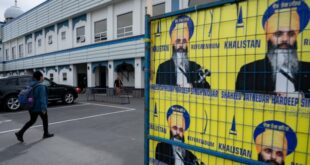Political leaders contain all of the elements of humanity, magnified

There was a play written about Pierre Trudeau and Margaret Sinclair — Maggie and Pierre: A Fantasy of Love, Politics and the Media, a one-woman play performed by Linda Griffiths.
It premiered at Theatre Passe Muraille in Toronto in 1980, toured the country and then played for five nights at the historic Royal Alexandra Theatre 1981, while Pierre Trudeau was still in office. It was revived in 2018, three years after Pierre and Maggie's firstborn son, who is referenced by name in the play, became prime minister.
"I like to think of Maggie and Pierre as 'epic characters,'" Griffiths once explained. "They are heroes in that they contain all the elements of humanity, magnified."
There may never be another public coupling quite like Maggie and Pierre. Their eldest son doesn't have the cool mystique of his father. And the dissolution of Justin and Sophie's marriage has not, perhaps thankfully, been nearly as dramatic and tumultuous as that of Maggie and Pierre.
But news of the prime minister's separation from his wife was not only the most-read story at the CBC yesterday (by far), it was also the most-read story at the BBC. Both People magazine and TMZ covered the story and featured it prominently. In the United Kingdom, both the Telegraph and the Times put pictures of the Canadian prime minister and his estranged wife on the front page. (The major papers in the United States might have had more room for the story if their former president had not just been indicted for trying to overthrow the country's democratic order.)
In a remarkable memo written shortly before the official separation of Pierre Trudeau and Margaret Sinclair, one of the prime minister's top advisors told Trudeau that his marriage was "the topic at every dinner table in the country and will be for a while."
As Griffiths said, "Their story has already been shared by the whole country, and actually, by a lot of the world as well."
Something like that is true now of Justin Trudeau and Sophie Grégoire Trudeau. In their own way, they are "humanity, magnified."
The thin line between the political and personal
If there is some tacit agreement that a politician's personal life is, to a great degree, off limits from public scrutiny — that a public official is entitled to some privacy — it is also understood that a politician must display some humanity, often by disclosing or displaying some parts of what might otherwise be considered their personal lives. Their spouses and children appear alongside them. They sit for interviews about their home life. They post pictures of their weekend activities. They write books about their upbringing.
A story that is inspiring or "relatable" is retold as much as possible. A spouse who is a charismatic or enthusiastic presence on the campaign trail is commonly considered an "asset."
But these displays of humanity are not entirely cynical. Politics is a human enterprise. And it is neither surprising nor wrong if voters want to know not just what a politician would do, but who they are — even if it is necessary to question how much voters ever really know about who their leaders are.
For Justin Trudeau, as always, there are additional layers.

He and Sophie Grégoire Trudeau always seemed like enthusiastic participants in the mixing of personal and political. As prime minister, Justin Trudeau has also been exceedingly public, both professionally and personally. His fallibility and contradictions have been laid bare. His emotions too — he is a hugger and a crier.
But for Trudeau, the personal — or, at least, great pieces of it — has always been political. His birth was national news. His parent's separation, five-and-a-half years later, was international news. In the years that followed there were more shared events: his youngest brother's death, his father's death, his own marriage, his mother's disclosure of mental illness, the birth of his own children.
To that list is now added his separation, the first for a prime minister since his mother and father agreed to go their separate ways — his personal life is its own precedent.
Will there be political consequences?
It is almost impossible to know what, if anything, this will mean for him politically. It can seem crass to even speculate — this is, after all, a deeply human situation, with real impacts for real people.
But it's also not hard to imagine that it could have political consequences — if only because of the apparent public appetite for the story. Readership for the report of their separation on Wednesday was exponentially higher — by leaps and bounds — than readership for the other major political news of the day: that the federal government is ahead of schedule on its plan to plant two billion trees over the next decade.
Strictly speaking, the trees will probably end up having a greater impact on the future of the planet. But it's easy to see why the other story might generate more immediate interest.
If the spouses of other party leaders seem particularly prominent during the next election, it will be tempting to wonder whether an implicit message is being sent. But the simplistic ideal of the nuclear family has been stretched and expanded over the last 50 years. There are likely few Canadians who haven't either experienced a separation themselves or know someone who has.
Trudeau separation brings private matter into the public eye
Catherine Cullen, host of CBC Radio's The House, looks at Prime Minister Justin Trudeau and Sophie Grégoire Trudeau's separation announcement and the political and procedural issues that may follow the deeply personal decision.
There may yet be questions too about whether the stress in his personal life has somehow negatively impacted his performance of his official duties. Though the asking of that question would suggest we should more regularly ask political leaders about the potential stressors in their lives, including how well they're sleeping and eating. (In case you were wondering, Trudeau is said to be very disciplined about both his sleep and his diet.)
This week's announcement will undoubtedly change something, however great or small, about the story of Trudeau's political life.
Public interest may wane. But the fact of the separation will linger as context. Reporters will feel obligated to ask something whenever he next appears before cameras. He will be watched closely for a while now to see how he carries himself and whether he betrays any sign of strain.
In that memo from 1977, Pierre Trudeau's advisor — Jim Coutts — commended him on the "superb posture" he adopted and stressed the importance of maintaining it. It is perhaps not the sort of note one would typically send to a boss who was going through a difficult time. But a reader can feel Coutts's sense of the stakes.
In such moments, humanity is magnified and voters get to see how well the politician withstands the glare.
*****
Credit belongs to : www.cbc.ca
 MaharlikaNews | Canada Leading Online Filipino Newspaper Portal The No. 1 most engaged information website for Filipino – Canadian in Canada. MaharlikaNews.com received almost a quarter a million visitors in 2020.
MaharlikaNews | Canada Leading Online Filipino Newspaper Portal The No. 1 most engaged information website for Filipino – Canadian in Canada. MaharlikaNews.com received almost a quarter a million visitors in 2020.







